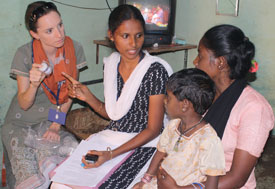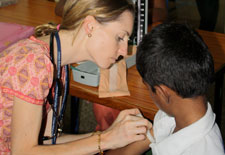Fogarty scholar paves career path in India
November / December 2011 | Volume 10, Issue 6

Photo by M. Thiyagarajan
Fogarty Scholar Lucy Horton, left, said her
experience in ndia helped her decide to pursue
a career in international infectious diseases.
By Steve Goldstein
It was a long way from identifying bird calls as her first high school research project in Manhattan, to listening to the heart sounds of a young schoolboy in the dusty southern Indian city of Vellore. For Lucy Horton, it was a culmination of sorts of her love of research and a year that clarified her desire to pursue a career in infectious disease.
As a Fogarty International Clinical Research Scholar, Horton spent the past year investigating the alarmingly high rate of chronic kidney disease that is affecting young children in Vellore. Since the Fogarty program began, more than 500 advanced health science students and post-doctoral fellows have had the opportunity to participate in mentored clinical research at NIH-funded centers in developing countries. Horton, who will graduate next spring with both an M.D. and a master's in public health from Tufts University, said she relished the unique experience.
"It was a great research opportunity because I was there for a length of time, as opposed to doing it during breaks at medical school or during summer vacations," said Horton. "I was able to work through various stages - creating a research plan, going through an Institutional Review Board, organizing a field team - as well as coordinating with a lab."
Based at Vellore's Christian Medical College (CMC), Horton worked with Dr. Madhumathi Rao, a CMC alumnus and Tufts professor, and was mentored by Dr. Gagandeep Kang, CMC's head of Gastrointestinal Science. They worked together to test a hypothesis that recurring diarrhea and resulting dehydration during infancy - coupled with chronic low birth weight, malnutrition and immunological disorders - may play a significant role in early development of renal disease.

Photo by Louise Borst
Horton screened study participants for
evidence of kidney damage.
Horton spent much of her time in a small urban health clinic in a slum roughly five miles outside Vellore where she managed a team of field workers. "They gave me the clinic for the second half of each day so I could work on my study," she explained. "One field worker would go out to homes to recruit patients and the other worked with me partly as a translator."
For nearly five hours a day, Horton was on her own, dealing with small crises. "Research always comes with bumps along the way, but when you do it in India, it gets magnified because there are so many idiosyncrasies about the ways things work," she said. "It forced me to think creatively and to problem solve - like how to get the urine samples to the lab on time when the refrigerator disappeared and the motorcycle driver was out of gas but hadn't gotten his paycheck to be able to buy gas."
Yet Horton said the small frustrations did not detract from the big picture, which is that "each day of fieldwork can contribute to something," she said. "In the end I was able to follow almost the entire 300-child cohort in the study, and that was very rewarding."
In November, Horton presented her abstract detailing how gastrointestinal infections are a risk factor for chronic childhood kidney disease at the American Society of Nephrology Annual Conference in Philadelphia.
The Manhattan native said she is grateful for the support from Fogarty and Vanderbilt University's Institute for Global Health, which helped administer the program. Her fellowship experience helped her decide on a career in international infectious disease that combines both her interest in clinical work and her passion for research. After India, she said, "I was completely sure about my next steps in residency applications and what programs I'm interested in."
More Information
To view Adobe PDF files,
download current, free accessible plug-ins from Adobe's website.